行酒令英文介绍
酒令
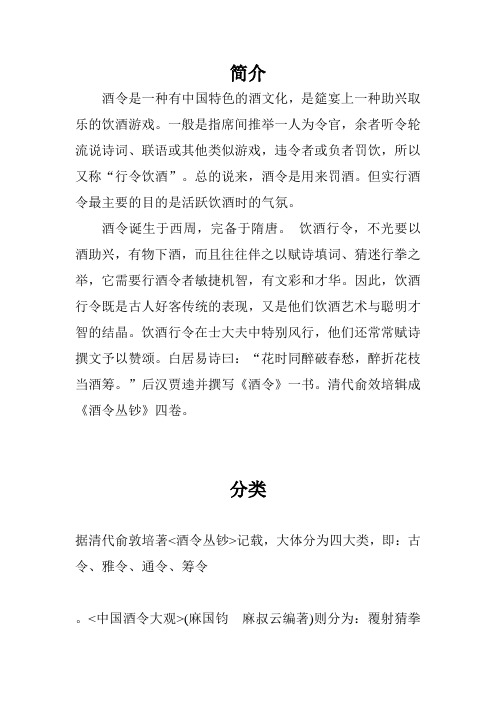
简介酒令是一种有中国特色的酒文化,是筵宴上一种助兴取乐的饮酒游戏。
一般是指席间推举一人为令官,余者听令轮流说诗词、联语或其他类似游戏,违令者或负者罚饮,所以又称“行令饮酒”。
总的说来,酒令是用来罚酒。
但实行酒令最主要的目的是活跃饮酒时的气氛。
酒令诞生于西周,完备于隋唐。
饮酒行令,不光要以酒助兴,有物下酒,而且往往伴之以赋诗填词、猜迷行拳之举,它需要行酒令者敏捷机智,有文彩和才华。
因此,饮酒行令既是古人好客传统的表现,又是他们饮酒艺术与聪明才智的结晶。
饮酒行令在士大夫中特别风行,他们还常常赋诗撰文予以赞颂。
白居易诗曰:“花时同醉破春愁,醉折花枝当酒筹。
”后汉贾逵并撰写《酒令》一书。
清代俞效培辑成《酒令丛钞》四卷。
分类据清代俞敦培著<酒令丛钞>记载,大体分为四大类,即:古令、雅令、通令、筹令。
<中国酒令大观>(麻国钧麻叔云编著)则分为:覆射猜拳类68种;口头文字类348种;骰子类128种;骨(牙)牌类38种;筹子类78种;杂类56种等六大类,计726种。
几种重点酒令春秋战国:投壶最古老而又持久的酒令当首推投壶。
投壶产生于春秋前,盛行于战国,因其最具封建礼仪教仁意义,所以沿袭最久。
春秋战国时期,诸侯宴请宾客时的礼仪之一就是请客人射箭。
投壶源自于射礼,郑注《礼记》云:“投壶,射之细也。
”又司马光《投壶新格》云:“其始必于燕饮之间,谋以乐宾,或病于不能射也,举席间之器以寄射节焉。
”由此可知,投壶是由于场地因素或个人因素的限制不能举行射礼而采取的权宜之计。
作为礼仪的一种,投壶不仅继承了射礼的仪节,还继承了射礼正己修身的礼义,正如清徐士恺《投壶仪节》云:“投壶乃射礼之变也。
”《礼记·投壶经》曰:“壶颈修七寸,腹修五寸,口径二寸半,容斗五升。
壶中实小豆焉,为其矢之跃而出也。
矢以柘若棘,长二尺八寸,无去其皮,取其坚而重。
投之胜者饮不胜者,以为优劣也。
投壶在战国时得到相当发展,当时的文者倾向于内心修养,投壶这种从容安详、讲究礼节的活动,正适合他们的需要。
中国酒令
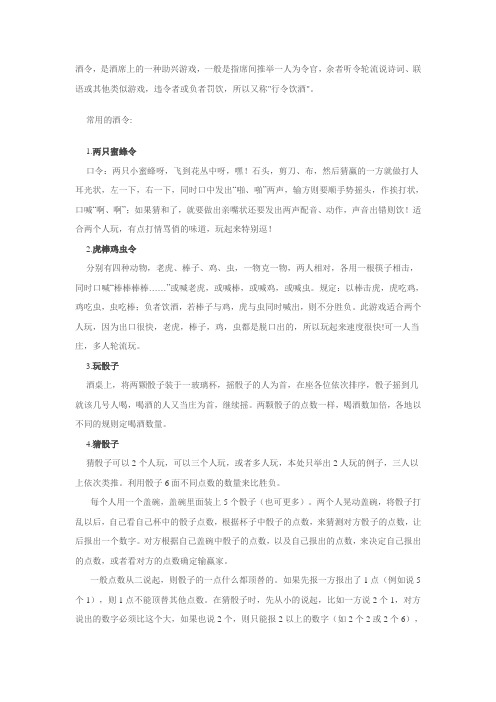
酒令,是酒席上的一种助兴游戏,一般是指席间推举一人为令官,余者听令轮流说诗词、联语或其他类似游戏,违令者或负者罚饮,所以又称"行令饮酒"。
常用的酒令:1.两只蜜蜂令口令:两只小蜜蜂呀,飞到花丛中呀,嘿!石头,剪刀、布,然后猜赢的一方就做打人耳光状,左一下,右一下,同时口中发出“啪、啪”两声,输方则要顺手势摇头,作挨打状,口喊“啊、啊”;如果猜和了,就要做出亲嘴状还要发出两声配音、动作,声音出错则饮!适合两个人玩,有点打情骂俏的味道,玩起来特别逗!2.虎棒鸡虫令分别有四种动物,老虎、棒子、鸡、虫,一物克一物,两人相对,各用一根筷子相击,同时口喊“棒棒棒棒……”或喊老虎,或喊棒,或喊鸡,或喊虫。
规定:以棒击虎,虎吃鸡,鸡吃虫,虫吃棒;负者饮酒,若棒子与鸡,虎与虫同时喊出,则不分胜负。
此游戏适合两个人玩,因为出口很快,老虎,棒子,鸡,虫都是脱口出的,所以玩起来速度很快!可一人当庄,多人轮流玩。
3.玩骰子酒桌上,将两颗骰子装于一玻璃杯,摇骰子的人为首,在座各位依次排序,骰子摇到几就该几号人喝,喝酒的人又当庄为首,继续摇。
两颗骰子的点数一样,喝酒数加倍,各地以不同的规则定喝酒数量。
4.猜骰子猜骰子可以2个人玩,可以三个人玩,或者多人玩,本处只举出2人玩的例子,三人以上依次类推。
利用骰子6面不同点数的数量来比胜负。
每个人用一个盖碗,盖碗里面装上5个骰子(也可更多)。
两个人晃动盖碗,将骰子打乱以后,自己看自己杯中的骰子点数,根据杯子中骰子的点数,来猜测对方骰子的点数,让后报出一个数字。
对方根据自己盖碗中骰子的点数,以及自己报出的点数,来决定自己报出的点数,或者看对方的点数确定输赢家。
一般点数从二说起,则骰子的一点什么都顶替的。
如果先报一方报出了1点(例如说5个1),则1点不能顶替其他点数。
在猜骰子时,先从小的说起,比如一方说2个1,对方说出的数字必须比这个大,如果也说2个,则只能报2以上的数字(如2个2或2个6),如果要说1数字,则只能报3个以上(如3个1或6个1)。
行酒令
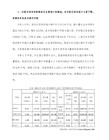
7.虎克船长游戏,就是被叫到虎克船长的人要做出敬礼的动作 同时身边左右二人分别向两侧做划船动作 三人同时嘴里喊“嗨咻嗨咻”。(跟上面的蒙娜丽莎有点像)
13.“我爱你不要脸”:对左边的人只能说我爱你,对右边的人只能说不要脸。随意传。但是相邻两个人连续对话不能超过三次,速度快的话会有人说:不,我爱你;我不要脸……笑倒
14。游戏名目:007。很好玩,和前面的蒙娜丽莎,虎克船长玩法一样,不同的是点到七的那个人还必须对另一个人(做出拿手枪发射的动作,嘴巴发出bia这个声音),然后被击中的人要面无表情雷打不动的样子,旁边的人却要立即反应出啊的声音,双臂要做出投降姿势.这个游戏好玩的是,往往被击中的过于紧张,被bia到了就马上啊了出来,保持不了镇定啊!还有更甚的,相差十万八千里坐的哥们因为紧张也冷不防来声啊,或者来个投降姿势。
22.水果园:开头的人说“水果园”,后面的每人说出一种水果名称,如苹果,梨,桃子。。。。重复或者迟钝的喝酒。
以此类推,有动物园,蔬菜园,植物园,甚至人体器官园。。。。
23.几炮瞄几炮:方法很简单比如8个人分好从1炮到8炮,随便一个人开始说。比如说的那人是2炮。就说2炮瞄几炮(比如3.4.5炮等)被瞄到的人接着说几炮瞄几炮,听着好像很简单,但是自己说下就知道了。。常常嘴就瓢了,变成猫啊票啊的。。很搞笑。。说错的人喝吧
4:说时间的增减,比如:加5秒,减10秒。
5:点哪张牌和那张牌,比如:7和J,6和9。
中国酒文化英文介绍
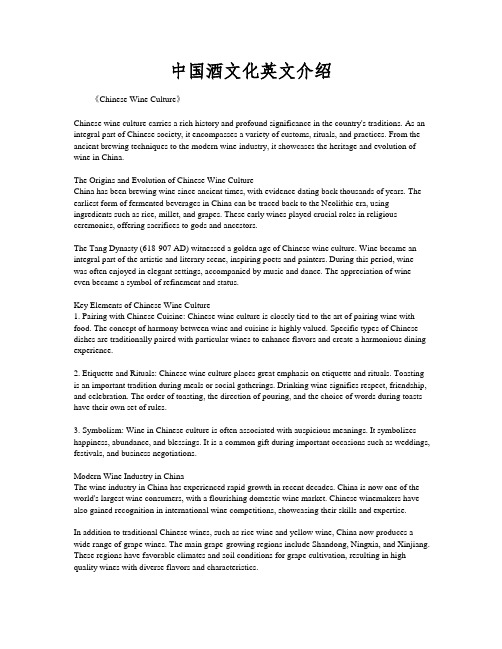
中国酒文化英文介绍《Chinese Wine Culture》Chinese wine culture carries a rich history and profound significance in the country's traditions. As an integral part of Chinese society, it encompasses a variety of customs, rituals, and practices. From the ancient brewing techniques to the modern wine industry, it showcases the heritage and evolution of wine in China.The Origins and Evolution of Chinese Wine CultureChina has been brewing wine since ancient times, with evidence dating back thousands of years. The earliest form of fermented beverages in China can be traced back to the Neolithic era, using ingredients such as rice, millet, and grapes. These early wines played crucial roles in religious ceremonies, offering sacrifices to gods and ancestors.The Tang Dynasty (618-907 AD) witnessed a golden age of Chinese wine culture. Wine became an integral part of the artistic and literary scene, inspiring poets and painters. During this period, wine was often enjoyed in elegant settings, accompanied by music and dance. The appreciation of wine even became a symbol of refinement and status.Key Elements of Chinese Wine Culture1. Pairing with Chinese Cuisine: Chinese wine culture is closely tied to the art of pairing wine with food. The concept of harmony between wine and cuisine is highly valued. Specific types of Chinese dishes are traditionally paired with particular wines to enhance flavors and create a harmonious dining experience.2. Etiquette and Rituals: Chinese wine culture places great emphasis on etiquette and rituals. Toasting is an important tradition during meals or social gatherings. Drinking wine signifies respect, friendship, and celebration. The order of toasting, the direction of pouring, and the choice of words during toasts have their own set of rules.3. Symbolism: Wine in Chinese culture is often associated with auspicious meanings. It symbolizes happiness, abundance, and blessings. It is a common gift during important occasions such as weddings, festivals, and business negotiations.Modern Wine Industry in ChinaThe wine industry in China has experienced rapid growth in recent decades. China is now one of the world's largest wine consumers, with a flourishing domestic wine market. Chinese winemakers have also gained recognition in international wine competitions, showcasing their skills and expertise.In addition to traditional Chinese wines, such as rice wine and yellow wine, China now produces a wide range of grape wines. The main grape-growing regions include Shandong, Ningxia, and Xinjiang. These regions have favorable climates and soil conditions for grape cultivation, resulting in high-quality wines with diverse flavors and characteristics.ConclusionThe book《Chinese Wine Culture》 unveils the fascinating history, customs, and rituals behind China's wine culture. From ancient rituals to modern winemaking, it invites readers to explore the rich heritage and diverse flavors of Chinese wines. With its unique traditions and profound symbolism, Chinese wine culture continues to thrive and captivate both domestic and international audiences.。
中国酒文化英文介绍Chinese wine culture introduction

Chinese wine culture continued to develop during the Qin and Han dynamics (221 BC-AD 220), absorbing influences
from other regions and cultures
The Characteristics and Influence of Chinese Wine Culture
• Seating arrangements: The host should greet the guests first, and then the guests should greet the host The seat of honor should be offered to the most senior guest
03 The drinking etiquette and cus
Table Culture and Etiquette
• Table setting: The table should be set with a clean and tidy table, and the placement of plates, cups, and wine bottles should be appropriate
Harbin
Another popular Chinese beer, brewed in Harbin, with a rich and malty taste
Yanjing
A Beijing based beer, known for its light and refreshing taste, and often consumed during hot summer days
中国酒文化英文版介绍
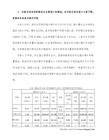
Baijiu(“white liquor" )
• Baijiu, which includes spirits, is made from sorghum高粱, corn, barley or wheat, most of which are easy to ferment. Colorless and transparent(透 明的), Liquors of this type typically contain more than 30% alcohol in volume since they have undergone distillation. Some white liquors contain over 50% alcohol. The alcohol strength varies between 55 and 65 percent. A small quantity can make one tipsy(醉人的) in a moment. Of the most famous of baijiu are Guizhou Maotai, Wuliangye, Shanxi Fenjiu and Luzhou Daqu.
• These wine are traditionally pasteurized (巴氏消毒), aged(熟化), and filtered (过滤) before their final bottling for sale to consumers. • The alcohol content is mild, at around 15%. Huangjiu can also be distilled(蒸馏) to produce baijiu(white liquors) and it is used as the base of “yaojiu” (medicated liquors ). It is also an excellent condiment(佐料,调味品)for cooking. Among these liquors the Shaoxing Rice Wine is the most famous.
中国酒文化英文介绍Chinese-wine-culture-introduction
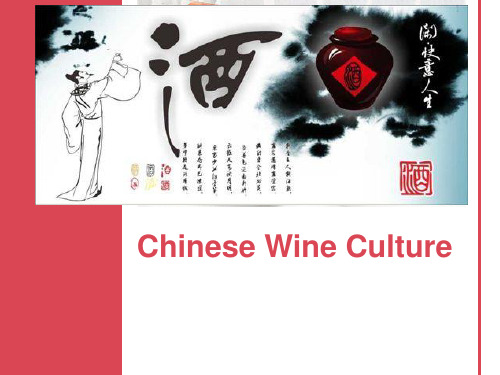
黄酒Chinese Wine
☺ Chinese yellow wine, also known as rice wine, is a classic Chinese brew and one of the three most important brews of the world (which include yellow wine, grape wine and beer).
In accordance with the sugar content, wine can be divided into: sweet wine (more than 10%), semi-sweet wine ( 5% -10%), semiliquor (0.5% -5%) and dry wine (0.5%).
Wuliangye (五粮液) Jiugui (酒鬼)
果酒Fruit Wine
☺Fruit wine was made from fruits and berries through direct fermentation, with an alcohol content of about 15%. Its flavor varies, hinging on the different fruits used as raw materials, and it retains the aroma of the fruits from which it was made. Fruit wine has a higher nutritional value. Grape wine is a typical kind of fruit wine.
中国酒文化英文介绍Chinese wine culture introduction
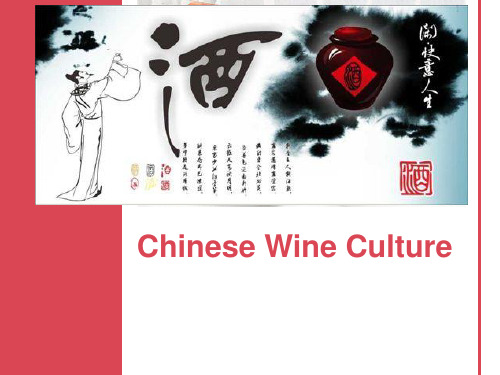
Wuliangye (五粮液) Jiugui (酒鬼)
果酒Fruit Wine
☺Fruit wine was made from fruits and berries through direct fermentation, with an alcohol content of about 15%. Its flavor varies, hinging on the different fruits used as raw materials, and it retains the aroma of the fruits from which it was made. Fruit wine has a higher nutritional value. Grape wine is a typical kind of fruit wine.
白酒 White Liquor
☺ White liquor, traditional Chinese distilled liquor, also known literally as “stewed wine” or “white dry”, is one of the world’s six most famous distilled wines (white liquor, brandy, whiskey, vodka and rum).
☺It’s a kind of integrated wine, and it can only be bought in Chinese herbal medicine stores.
啤酒Beer
☺Using barley as the raw material and hops as the flavor, beer is brewed to be a low alcohol wine, with the content of alcohol generally between 2% -5%. Beer has a unique bitterness and aroma, tasting pure and refreshing. Poured into a cup, it will form a large amount of foam泡沫.
《将进酒》中英文版

《将进酒》中英文版《将进酒》中英文版李白在《将进酒》一诗中表达了对怀才不遇的感叹,又抱着乐观、通达的情怀,也流露了人生几何当及时行乐的消极情绪。
但全诗洋溢着豪情逸兴,取得出色的艺术成就。
《将进酒》即其代表作。
下面是学习时间啦,小编为大家提供《将进酒》中英文对照,快来看看吧!【原文】将进酒唐李白君不见黄河之水天上来,奔流到海不复回。
君不见高堂明镜悲白发,朝如青丝暮成雪。
人生得意须尽欢,莫使金樽空对月。
天生我材必有用,千金散尽还复来。
烹羊宰牛且为乐,会须一饮三百杯。
岑夫子,丹丘生,将进酒,杯莫停。
与君歌一曲,请君为我倾耳听。
钟鼓馔玉不足贵,但愿长醉不复醒。
古来圣贤皆寂寞,惟有饮者留其名。
陈王昔时宴平乐,斗酒十千恣欢谑。
主人何为言少钱,径须沽取对君酌。
五花马,千金裘,呼儿将出换美酒,与尔同销万古愁。
【英文版】Don't you see the water of the Yellow River coming up from the sky and rushing to the sea without returning.You can't see the bright mirror in the high hall with sad white hair. The morning is like green silk and the evening becomes snow.Be happy when you are happy in life. Don't make the golden cup empty to the moon.I am born in heaven and I will be useful. When the money is gone, it will come back.Cook sheep and kill cattle for fun, and drink 300 cups at a time.Master Cen, born in Danqiu, never stop drinking.Sing a song with you, please listen to it for me.The bell, drum, dinner and jade are not expensive enough. I hope I can never wake up after being drunk for a long time.In ancient times, all sages and sages were lonely, but only those who drank kept their names.In the past, the King of Chen enjoyed a peaceful banquet and enjoyed banquets and banquets with thousands of people.What is the reason why the master says he has little money? He must sell it and drink it to you.Five flowered horses, a thousand golden furs, Hu'er will exchange for good wine, and they will sell the everlasting sorrow with you.拓展阅读《将进酒》赏析:李白咏酒的诗篇极能表现他的个性,这类诗固然数长安放还以后所作思想内容更为深沉,艺术表现更为成熟。
中国酒文化的英文介绍
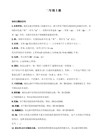
The Spirits CultureIn the long history of China, many things are more advanced than the rest of the world and spirits is one of them. Chinese spirits, just like the ancient Chinese culture,has deeply influenced people’s life and culture in China.Today, my topic is Chinese spirits culture.my speech has 5 main parts.the origin of Chinese spirits culture, Traditional Spirits Brewing, Spirits Tasting,function of spirits,and the proper amount of drinking spirits.The history of spirits can be dated back to the Shanggu period. In 史记·殷本纪there was some record about spirits: “King Zhou made a spirits pool and hung meat like a forest; drinking all night long.” In 诗经there were some poems about spirits: “October is the time to harvest the grain to make spirits, and to use the spirits to celebrate the longevity of the senior.” Those records indicated that spirits had a history of at least five thousand years.Traditional Spirits BrewingIt has a history of several thousand years and the traditional fermenting technique developed gradually into a mature level. Even in present day, the natural fermenting technique has not disappeared completely and something about such technique still remains a mystery. People made spirits based on their experience and the production scale was relatively small. Everything was done by manual labor and there were no reliable standards to guarantee the quality of spirits.Spirits TastingPeople use their sensory organs (visual, olfactory, taste, touch) to evaluate the quality of spirits, distinguish good and bad spirits, grade it and tell the features of it. That’s what we call spirits tasting. Judging the quality of spirits according to some standards of physical and chemical analyses is not enough. Until now, no equipment can tell all flavors in a comprehensive and accurate way. Whether the color, flavor and taste of a certain spirits can be accepted by the people of a certain country or region should be decided by spirits tasting itself.Spirits tasting is a science. It is also a traditional craft handed down by our ancestors.Function of spiritsSpirits was used to celebrate different festivals, wedding ceremonies and birthday parties, to memorize the departed, to welcome and send off relatives and friends, to congratulate the good news and to get rid of anxiety, to cure diseases and prolong life, both for the king and ordinary people.As for the spirits lovers, three cups of spirits will make them very comfortable and happy, feeling like the immortal. All unhappiness will disappear. At that time, people’s nature will return. The evil will become kind; the cowards will be brave; the stupid will become clever. The poor can express their anger; the strong can boost their spirits and the powerful can make theirdecisions.Many poets wrote poems about spirits. “Our minds care for the whole world, but our interests are all in a single cup of spirits.”Starting For The FrontFrom cups of jade that glow with wine of grapes at night,Drinking to pipa songs, we are summoned to fight.Don't laugh if we lie drunk upon the battleground!How many warriors ever came back safe and sound?Upper limit of drinking spiritsFrom the standpoint of healthy life, one should drink spirits properly, and wine is the best drink.There is no standard how much one can drink mostly. Generally speaking, a normal person can drink 0.6 ~ 0.8 milliliters pure alcohol each time for every 1 kilogram of his body weight, Such amount will not only do no harms, but make a person relaxed and happy. So at this scale, a 60 kg person can drink Beer: about 1.5 to 2 bottles,Wine (12 degrees) : 6 ~ 8 liang (300-400mL) ;Rice wine: 4.5 ~ 6 liang (225-300mL);Brandy, whisky: 1.6 ~ 2.2 liang (80-110mL);Liquor (65 degrees) 1 ~ 1.4 liang (50-70mL).。
英语作文诸葛亮草船借箭后的祝酒词

全文分为作者个人简介和正文两个部分:作者个人简介:Hello everyone, I am an author dedicated to creating and sharing high-quality document templates. In this era of information overload, accurate and efficient communication has become especially important. I firmly believe that good communication can build bridges between people, playing an indispensable role in academia, career, and daily life. Therefore, I decided to invest my knowledge and skills into creating valuable documents to help people find inspiration and direction when needed.正文:英语作文诸葛亮草船借箭后的祝酒词全文共3篇示例,供读者参考篇1My friends, today we gather to celebrate one of the most cunning and celebrated strategists in all of history - Zhuge Liang, the Crouching Dragon. His brilliant exploits are the stuff of legend, and today we raise our cups to his most famous victory - the Battle of Maling, where through his unparalleled wit andguile, he emerged triumphant against seemingly insurmountable odds.As we all know, Zhuge Liang found himself in a dire situation. His army was vastly outnumbered by the forces of the formidable Cao Cao, and they were trapped, their path of retreat blocked by the impassable Tsung River. Lesser men may have surrendered to despair, but not our Crouching Dragon. With his keen mind ever turning, he devised an ingenious stratagem.He ordered his men to strip the boats of their requirements - planks, masts, and anything that could float. Using these materials, they constructed a makeshift pontoon bridge across the deceptively narrow river. Cao Cao's men watched with amusement, mocking this seemingly futile effort. Little did they know, they had played right into Zhuge Liang's hands.Under the cover of night, Zhuge dispatched a band of his soldiers in small craft upstream, Each warrior carried a sheaf of tightly bundled straw crafted to resemble arrows. At his signal, they were to release the "arrows" into the current to float downstream towards Cao's forces. The trap was set, and now all that remained was the bait.The next morning, Zhuge Liang's men made an overstated display of beginning their crossing via the makeshift bridge.Cao's troops hastened to the riverbank, eager to easilyput this retreat to an end. But then the strange "arrows" began drifting into view from upstream. The soldiers' eyes grew wide as the impressively vast supply seemed to multiply endlessly around each bend.In that moment, Cao's men saw their vaunted numbers rendered meaningless. Even if they slew every last of Zhuge's army, they could never exhaust such an inexhaustible quiver of ammunition. The fought courage and resolve within them. Thinking his foes had somehow conjured an unlimited cache of arrows by sorcery, the superstitious Cao Cao had no choice but to order his forces to scatter and retreat.And so, through unsurpassed brilliance and perception, outwitted and outmaneuvered, Zhuge Liang lived to fight another day. His mastery of psychology and deception had trumped even the most staggering imbalance of martial might. On this day, a scholar's mind triumphed over brute force. Who among us would not raise a cup to such genius?To be sure, there were other factors that secured Zhuge Liang's ultimate victory in that years-long conflict. His leadership acumen and perfection of the combined earth-wood-fire cannon were instrumental. But it was his use of subterfuge at Maling thatshowed his true inventive virtuosity. By staying one mind-turn ahead of his opponents, he achieved the most unlikely of successes.This is a lesson from which we should all learn. Raw power and naked ambition are blunt instruments that obscure the bigger picture. To truly master any field - be it the military machinations of Zhuge's era or the Commerce battles of our modern world - one must apply not just skills and knowledge, but creativity, perception and psychological mastery. A brilliant strategy does not merely consist of chasing obvious goals by conventional means, but envisioning from every angle to turn the entire situation through indirect action. Like a skilled martial artist uses their opponent's force against them, so too must we leverage the inertia and assumptions of others to ultimately emerge victorious.And so we raise our cups to honor and emulate the genius of Zhuge Liang. Though he has been dust for centuries, the depth of his strategic wisdom surely echos down through the ages to inspire us still. We drink to his legacy - that vision, deception and mental suppleness will always conquer over brutish, head-on force. On this, the anniversary of the Battle of Maling, we rededicate ourselves to walking the more cerebral path, in hisindelible example. May we each climb higher and change the world through the brilliant applications of our minds, just as he did so many years ago.篇2Esteemed lords, ladies, and fellow warriors! We gather here tonight to raise our cups and revel in the glory of our latest triumph over the forces of chaos and disorder. Our wise and brilliant strategist, the unparalleled Zhuge Liang, has once again demonstrated his unmatched mastery of the art of war through his ingenious Borrowing Arrows with Thatched Boats stratagem.Who among us could have foreseen such an audacious and cunning plan? To construct a grand fleet of ships fashioned entirely of woven reeds and straw, only to set them ablaze as tools of deception? This bold maneuver not only wrongfooted our foes, sowing disarray in their ranks, but achieved thenear-impossible feat of borrowing their own arrows to claim victory! Truly, the mind of Zhuge Liang operates on a plane far beyond our humble comprehensions.Let us raise our first toast to the brilliant architect of this grand stratagem! To Zhuge Liang - may your resourcefulness and strategic acumen ever shield us from the perils of war. Yourprofound wisdom has once more granted us the upper hand against insurmountable odds. We, your devoted followers, can but marvel at the depths of your sagacity. Drink, and be acclaimed!Yet even the most brilliant mind requires steadfast champions to breathe life into its machinations. Therefore, our next toast must honor the valorous warriors who fearlessly executed this daring ploy in the face of the enemy horde. To Liu Bei's elite corps - you stalwart heroes who manned the reed boats, stoking the fires that spread confusion and panic through the opposing ranks! To Zhang Fei and Guan Yu - your might in battle is eclipsed only by your unwavering loyalty. We raise our cups to your bravery and skill at arms.Nor can we overlook the unsung laborers who toiled endlessly to construct the reed fleet that made this stratagem possible. To the shipwrights and weavers who bent reed and straw to the service of war - your humble efforts have won you a chapter in the annals of legend! Without your calloused hands, this ruse could never have taken form. Drink, that your sacrifices be forever remembered!On this night of victory, even our celebrated strategist would urge us to set aside rigid discipline and revel in the hard-earnedspoils of war. Let the flowing wine loosen your tongues and fuel tales of hard-fought battles and heroic feats! Let the music swell to rouse your battle ardor and rekindle memories of glory achieved through sweat and steel.For those of you too young to have tasted the miseries of war - look upon the grizzled veterans who bear the scars of past campaigns like badges of honor. Learn from their sagas so that you may better honor their sacrifices on future fields of conquest. And when next you face the chaos of battle, let the memory of this latest triumph instill you with the unshakable conviction that our path is forever guided by the wisdom of the peerless Zhuge Liang.To conquest and the subjugation of the realm under the virtuous banner of Shu-Han! To the fulfillment of our imperial mandate to pacify the lands and unite all under heaven! May our celebrated strategist's counsel ensure our swords are ever turned toward just ends. Let our victories be proclaimed in paeans echoing through the ages!But most of all, let this night bear witness to the bonds of honor and martial brotherhood that make men of us! Let none forget the courage of our brothers who fell securing this latest victory. Though they may no longer march at our sides, theirnoble sacrifices will forever inspire us to deeds worthy of veneration.Drink and render homage to the hallowed memories of our fallen comrades! Let your reverent toasts shake the very rafters of heaven and carry their defiant spirits into the sublime realms of eternal glory! For it is in pursuing destinies carved from such undying honor and devotion to duty that we elevate ourselves from mere men into the exalted ranks of heroes eternal!So raise your cups high and let the wine wash away the weariness of hard-fought battles! Beat your chests and bellow out roars of hard-won triumph! Slake your thirsts and revel in companionship reforged in the crucible of war! For on this night, my brothers and sisters in arms, we are conquerors without peer under the all-encompassing wisdom and guidance of Zhuge Liang!Drink! Sing! Rejoice! Victory is ours! The realm shall forever bear witness to the glory of Shu-Han!篇3Esteemed warriors, officers, and soldiers - esteemed friends! We gather here tonight to celebrate a great victory against the formidable forces of Cao Cao's armies. Only days ago, oursituation seemed dire as we found ourselves surrounded and outnumbered at the banks of the Yangtze River. Escape seemed impossible with Cao's vast troops awaiting us. We stood little chance in open battle against his overwhelming strength.But our wise and brilliant strategist Zhuge Liang had a daring and ingenious plan! Follow me as I recount the tale of how through guile and trickery, we achieved this most improbable triumph against our enemies. You gentlemen were there on the battlefield, but allow me to retell the story so we may savor every delicious detail of our adversaries' audacious downfall!As Cao Cao's armies tightened their vice-like grip around our positions, it seemed there could be no escape. The waters of the Yangtze were at our backs, leaving no route for retreat or reinforcement. Supplies dwindled and morale waned in the face of inevitable defeat or capture. The end seemed certain and inescapable.It was then that the great Zhuge Liang revealed his unconventional stratagem. Under the cover of darkness, his men constructed a startling new naval force - thousands upon thousands of small boats, each fashioned from the humble materials of bamboo, wood, and woven grass. To the uninitiatedeye, they seemed little more than fire tinders. But the Master Strategist knew their worth!As dawn's first light crept over the eastern horizon, heavy ground fog still blanketed the river, obscuring our curious efforts from Cao's scouts. It was then that our newly constructed armada took to the waters in absolute silence. Each tiny craft bearing a lone warrior, with weapons and armor stowed for secrecy.The fog was our ally that morning, obscuring Cao Cao's vision while granting us concealment to press on undetected. The diminutive fleet made its way upriver, with Master Liang's instructions to act brazenly upon the arrival of our enemy's vanguard. When at last their lead forces came into view through the ethereal mists, our men sprang into action!With ear-splitting war cries, our fighters commenced unleashing endless volleys of raining arrows and javelins toward the opposing banks! Though none in our fleet could perceive their targets, the sheer ferocity of our sustained barrage suggested the presence of a fully armed naval armada of catastrophic proportions! Chaos erupted amongst Cao Cao's troops, certain they had blundered into an ambush of unfathomable magnitude.Seeing the events unfold from his vantage point, Cao Cao himself took stock of the distressing scene. Through the thick soup of lingering fog, all he bore witness to was a ceaseless hail of projectiles streaking from what seemed an impossibly vast naval force. He could scarcely fathom how we had amassed such maritime might without his knowledge! Surely, he thought, reinforcements from the kingdoms of Shu or Wu must have arrived under cloak of night!Withno option to assess the true situation, prudence demanded a retreat before his vanguard was overwhelmed. Cao had no choice but to call back his forces and hastily withdraw from the riverbanks. And like a cresting wave, our men reacted with thunderous cheers and shrill victory cries as we observed their withdrawal!The Master Strategist's daring deception carried the day! With shocking ease, we obliterated the supposed military superiority of our enemies and routed Cao Cao's armies into a humiliating retreat. All thanks to a makeshift flotilla of mere bamboo shafts and woven grass! This unassuming armada, each "vessel" manned by lone warrior, sold the illusion of our stockpiled naval might with ceaseless sound and fury!My friends, this victory secured by deception, inventiveness, and sheer audacity is one that shall forever echo through the ages! When faced with a foe of overwhelming numbers, our great Zhuge Liang did not meet brawn with brawn. Instead, he demonstrated the superior mind may triumph over brute force through cunning and subterfuge.We must raise our cups high this night in a celebratory toast! For though our road ahead and destiny remains unwritten, we have carved an indelible mark into the chronicles of conquest! Here's to Zhuge Liang, whose brilliance and faithful service to the kingdom of Shu Han shall be immortalized through his clever exploits on this day! Let our victory cries and songs shake the very halls of the heavens as we give thanks and invoke the fortunes of war to grace our continued campaigns!。
古代文学作品中的行酒令

古代文学作品中的行酒令第一篇:古代文学作品中的行酒令古代文学作品中的行酒令篇一:古代娱乐酒令古代娱乐酒令酒令的简介酒令,是酒席上的一种助兴游戏,一般是指席间推举一人为令官,余者听令轮流说诗词、联语或其他类似游戏,违令者或负者罚饮,所以又称“行令饮酒”。
酒令历史来源作为古代专门监督饮酒仪式的酒官,最早出现于西周后期。
《诗经· 宴之初筵席》:“凡此饮酒,或醉或否。
既立之监,又立之史。
”所谓酒监、酒史就是酒官。
汉代有了“觞政”,就是在酒宴上执行觞令,对不饮尽杯中酒的人实行某种处罚。
总的说来,酒令是用来罚酒。
但实行酒令最主要的目的是活跃饮酒时的气氛。
何况酒席上有时坐的都是客人,互不认识是很常见的,行令就象催化剂,顿使酒席上的气氛就活跃起来。
饮酒行令,是中国人在饮酒时助兴的一种特有方式。
酒令由来已久,开始时可能是为了维持酒席上的秩序而设立“监”。
汉代有了“觞政”,就是在酒宴上执行觞令,对不饮尽杯中酒的人实行某种处罚。
在远古时代就有了射礼,为宴饮而设的称为“燕射”。
即通过射箭,决定胜负。
负者饮酒。
古人还有一种被称为投壶的饮酒习俗,源于西周时期的射礼。
酒宴上设一壶,宾客依次将箭向壶内投去,以投入壶内多者为胜,负者受罚饮酒。
酒令成俗盛于唐代的士大夫间。
在唐代诗文中酒令频繁出现。
饮酒行令在士大夫中特别风行,他们还常常赋诗撰文予以赞颂。
白居易诗曰:“花时同醉破春愁,醉折花枝当酒筹。
”后汉贾逵并撰写《酒令》一书。
宋代不但沿袭了酒令习俗,而且还丰富发展了酒令文化。
单就记载介绍各种酒令的书就有《酒令丛钞》、《酒杜刍言》、《醉乡律令》、《嘉宾心令》、《小酒令》、《安雅堂酒令》、《西厢酒令》、《饮中八仙令》等。
酒令是中国酒文化的一枝色彩卓异的奇葩。
宋蔡宽夫诗话云:“唐人饮酒必为令,以佐欢乐。
”从地下发掘的考古材料也证明,唐代是一个喝酒成风,酒令盛行的时代。
如1982年在镇江丹徒丁卯村一座唐代银器窑中,发现了“论语玉烛”酒筹筒和五十根酒令筹,这是十分宝贵的唐代酒令资料。
中国酒文化的英语演讲稿
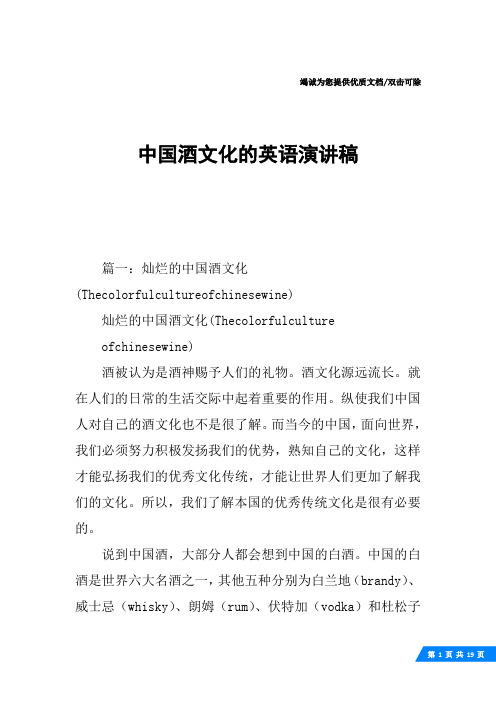
竭诚为您提供优质文档/双击可除中国酒文化的英语演讲稿篇一:灿烂的中国酒文化(Thecolorfulcultureofchinesewine)灿烂的中国酒文化(Thecolorfulcultureofchinesewine)酒被认为是酒神赐予人们的礼物。
酒文化源远流长。
就在人们的日常的生活交际中起着重要的作用。
纵使我们中国人对自己的酒文化也不是很了解。
而当今的中国,面向世界,我们必须努力积极发扬我们的优势,熟知自己的文化,这样才能弘扬我们的优秀文化传统,才能让世界人们更加了解我们的文化。
所以,我们了解本国的优秀传统文化是很有必要的。
说到中国酒,大部分人都会想到中国的白酒。
中国的白酒是世界六大名酒之一,其他五种分别为白兰地(brandy)、威士忌(whisky)、朗姆(rum)、伏特加(vodka)和杜松子酒(gin)。
外国友人在第一次品尝中国酒的时候都会很谨慎。
然而,只要他们尝过一两次,就会爱上各式的酒,并且开始享受饮酒的乐趣。
1、关于中国酒起源的传说(TheFairyTaleoftheoriginofchinesewine)我们的祖先放弃了她们的游牧生活,选择在黄河流域群居的时候,种植了多种多样的谷物,这为日后酿造美酒奠定了基础。
据说中国的酿酒技术始于夏朝。
仪狄和杜康,被认为是中国造酒业的鼻祖。
据史料记载,仪狄应君主禹的要求,付出了巨大的努力,终于成功地用发酵的糯米酿造出了芳醇的美酒。
生活在夏朝的杜康,凭借用高粱酿造出的美酒,而受到赞誉。
据史料记栽,冬日里的一天,杜康将一些煮过的高粱米放到了树洞里。
第二年春天,从这个树洞里散发出浓浓的香味,扑鼻而入。
之后,杜康发现正是发酵的高粱米散发出诱人的香气。
这个偶然的发现给了他用发酵的高粱米酿酒的灵感。
2、中国的国酒(ThenationalLiquor)——茅台(maotai)在重大历史事件中,如日内瓦会谈、中美建交,茅台酒都是打破历史坚冰的特殊利器。
党和国家领导人多次将茅台作为“国家级礼品”赠送给外国领导人。
行酒令英文介绍
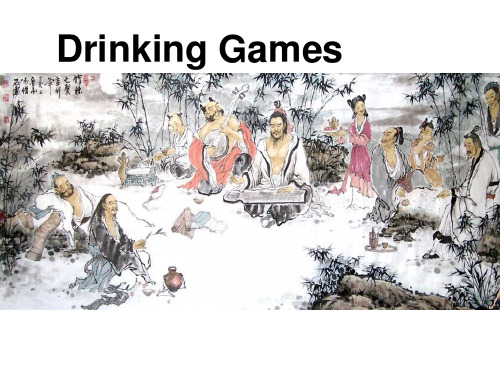
Seven(逢七过)
• People sitting, in succession, say numbers. • The first player says "one,” the second says “two,” and so on. • The person who is supposed to say “seven” must move directly to “eight.” • The players go on counting, avoiding the number “seven,” all of its multiples (14, 21 etc.) and all the numbers including “seven,”( 17, 27, 37 etc.) • The person who accidentally says a forbidden number has to be punished by taking a drink.
Dicing(骰子)
• Dice are rolled and contestants have to guess the number of spots. • Those who make an incorrect guess pay a forfeit by drinking a cup.
Finger Guessing(Cai Quan)
END
THANKS
(剩 了一张六合么)
• Grandmother Jia:“The red sun in the sky so bright.”
(一轮红日出云霄)
• Faithful: “A shock-headed devil with hair like tow.”
古代文学作品中的行酒令
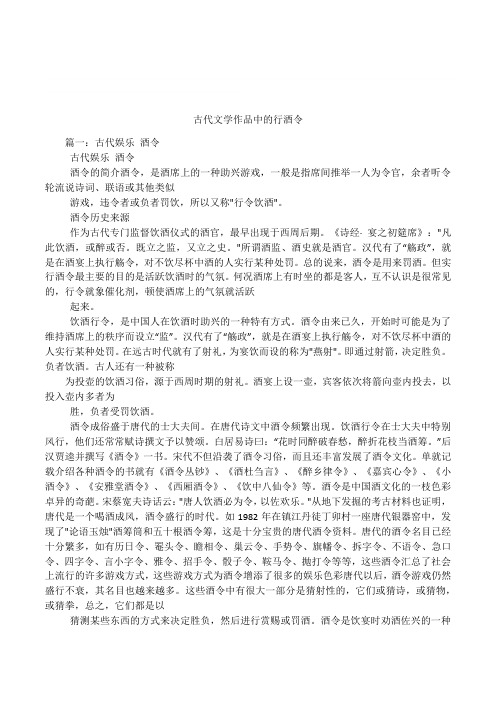
古代文学作品中的行酒令 篇一:古代娱乐 酒令 古代娱乐 酒令 酒令的简介酒令,是酒席上的一种助兴游戏,一般是指席间推举一人为令官,余者听令 轮流说诗词、联语或其他类似 游戏,违令者或负者罚饮,所以又称"行令饮酒"。
酒令历史来源 作为古代专门监督饮酒仪式的酒官,最早出现于西周后期。
《诗经· 宴之初筵席》:"凡 此饮酒,或醉或否。
既立之监,又立之史。
"所谓酒监、酒史就是酒官。
汉代有了“觞政”,就 是在酒宴上执行觞令,对不饮尽杯中酒的人实行某种处罚。
总的说来,酒令是用来罚酒。
但实 行酒令最主要的目的是活跃饮酒时的气氛。
何况酒席上有时坐的都是客人,互不认识是很常见 的,行令就象催化剂,顿使酒席上的气氛就活跃 起来。
饮酒行令,是中国人在饮酒时助兴的一种特有方式。
酒令由来已久,开始时可能是为了 维持酒席上的秩序而设立“监”。
汉代有了“觞政”,就是在酒宴上执行觞令,对不饮尽杯中酒的 人实行某种处罚。
在远古时代就有了射礼, 为宴饮而设的称为"燕射"。
即通过射箭, 决定胜负。
负者饮酒。
古人还有一种被称 为投壶的饮酒习俗,源于西周时期的射礼。
酒宴上设一壶,宾客依次将箭向壶内投去,以 投入壶内多者为 胜,负者受罚饮酒。
酒令成俗盛于唐代的士大夫间。
在唐代诗文中酒令频繁出现。
饮酒行令在士大夫中特别 风行,他们还常常赋诗撰文予以赞颂。
白居易诗曰:“花时同醉破春愁,醉折花枝当酒筹。
”后 汉贾逵并撰写《酒令》一书。
宋代不但沿袭了酒令习俗,而且还丰富发展了酒令文化。
单就记 载介绍各种酒令的书就有《酒令丛钞》、《酒杜刍言》、《醉乡律令》、《嘉宾心令》、《小 酒令》、《安雅堂酒令》、《西厢酒令》、《饮中八仙令》等。
酒令是中国酒文化的一枝色彩 卓异的奇葩。
宋蔡宽夫诗话云: "唐人饮酒必为令, 以佐欢乐。
"从地下发掘的考古材料也证明, 唐代是一个喝酒成风,酒令盛行的时代。
Cocktail Party
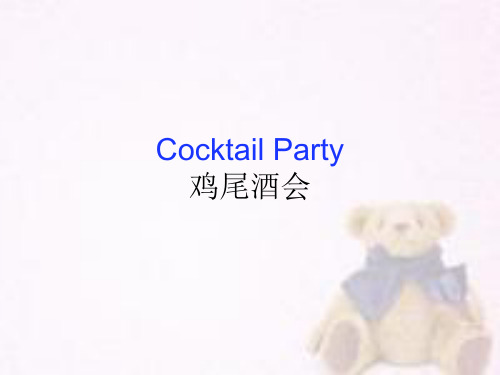
Table Manners 餐桌礼仪
• 餐巾应铺在膝上。如果餐巾较大,应双叠放在腿上;如 果较小,可以全部打开。餐巾虽然也可以围在颈上或系在 胸前,但显得不大方,所以最好不这样做。可用餐巾的一 角擦去嘴上或手指上的油渍,但绝不可用餐巾揩拭餐具。
• .
• 持匙用右手,手指务必持在匙柄之端,除 喝汤外,不用匙取食其他食物。 • 进餐时不要将碗碟揣起来。喝汤可以将盘 子倾斜,然后用汤匙取食。喝茶或喝咖啡 不要把汤匙放在杯子里。 吃饭,特别是喝汤,不要发出响声。咀 嚼时应该闭嘴。
• Eating noodles, you can roll up to eat with a fork, don't pick them up.
• 中途放下刀叉,应将刀叉呈“八”字形分别放在盘子上。 如果把刀叉放在一起,表示用餐完毕。
• To put down the knife and fork, knife and fork should be show "eight" glyph on the plate, respectively. If the knife and fork are to be put together, it means you have finished eating.
Warning
• 不要与外国人谈论政治,宗教,信仰以及家庭。切不可谈 及个人的私事,诸如年龄、婚姻、收入等等。看到别人买 的东西不可问其价格;如果看到别人回来,也不能问他去 哪儿了或者从哪里来,否则就会遭人厌恶,西方人常用 “Nose into somebody else‟s private life”这 句话来表示对提问人的轻蔑。 (鼻子伸到人家私生活里 来了)
• 西方见面的礼仪
- 1、下载文档前请自行甄别文档内容的完整性,平台不提供额外的编辑、内容补充、找答案等附加服务。
- 2、"仅部分预览"的文档,不可在线预览部分如存在完整性等问题,可反馈申请退款(可完整预览的文档不适用该条件!)。
- 3、如文档侵犯您的权益,请联系客服反馈,我们会尽快为您处理(人工客服工作时间:9:00-18:30)。
• Grandmother Jia:“The red sun in the sky so bright.”
(一轮红日出云霄)
• Faithful: “A shock-headed devil with hair like tow.”
(凑成却是个‘蓬头 鬼)
• Grandmother Jia:“Zhong Kui, let me go!”
Seven(逢七过)
• People sitting, in succession, say numbers. • The first player says "one,” the second says “two,” and so on. • The person who is supposed to say “seven” must move directly to “eight.” • The players go on counting, avoiding the number “seven,” all of its multiples (14, 21 etc.) and all the numbers including “seven,”( 17, 27, 37 etc.) • The person who accidentally says a forbidden number has to be punished by taking a drink.
• It is literally translated as “practising wine order”. • In this game, someone is made the commander(行令官) and others must obey his orders at the table, either to compose a poem or to do some other things. • The person who fails to carry out the order is penalized to drink.
• 'two kind brothers'(哥俩好) • 'making a fortune in four seasons'(四季发财)
Gong Show(击鼓传花)
• With one person beating a drum or gong, the others sitting around the table will quickly pass a flower from one to another. • When the drummer stops, whoever has the flower will drink and even give a simple performance according to the rules.
Dicing(骰子)
• Dice are rolled and contestants have to guess the number of spots. • Those who make an incorrect guess pay a forfeit by drinking a cup.
Finger Guessing(Cai Quan)
• • • •
3.Drink according to the etiquette.(依例饮酒。) 4.Justice for all.(行令时一律平等。) 5.Do exactly as M.C. say.(酒令不可违。) 6.No strict order.(不行苛令。)
History of drinking games
Drinking Games
The main content
History of drinking games
Several lines of drinking games
Drinking games
• a popular pastime with a long tradition in China. • adding fun to the drinking • to juice up the gathering(heighten the drinking atmosphere)
Rules of drinking games
• 1.The rules of drinking are as strict as the rules of war.(酒令如军令。 ) • 2.The M.C. (master of ceremonies )
令官(酒令中,凡有违规的,由令官决定处罚饮酒多少)。
END
THANKS
Ming and Qing Dynastry(明清时期)
• The period of prosperity of drinking is Qing Dynasty,the quantity of the achievements of drinking is large.
(清代是酒令的繁荣时期,酒令作品层次不穷。)
(这鬼抱住钟馗腿)
Arrow-Casting(投壶)
• Those unable to play archery indeed would find a substitute for the game, that is, to cast arrows into a flagon. • As the rule goes, the one who got the most hits was the winner while the loser would be made to drink.
• Two categories - general game and liபைடு நூலகம்eral game.
(两类——通令和雅令。)
Several lines of drinking games
Winding Creek and Floating Cups
• “There were spectacular mountains and magnificent peaks, flourishing forest and tall bamboos, and there, reflecting the scenery standing on the bank sides, were limpid rivulet with rapid stream, which was a channel for spirit cups floating downwards. We sat by the waterside in order, drinking and chanting.”
• Two people sit at the same table. • Using one hand, they simultaneously stretch out fingers and shout out a number between one and 10. • If a player guesses right,he/she wins. The loser then has to take a drink. • If both players guess right or if both guess wrong, the game continues.
--Preface to the OrchidPavilionCollection
(兰亭集序)
Threesomes with the dominoes
(骨牌令)
• Faithful:“On my left the bright blue sky.”(左边是张天) • Grandmother Jia:“The Lord looks down from heaven on high.”(头上有青天) • Faithful:“Five and six together meet.”(当中是个五和六) • Grandmother Jia:“By Six Bay Bridge the flowers smell sweet.”(六桥梅花香彻骨) • Faithful:“Leaves six and ace upon the right.”
The Six Dynasties Period(魏晋南北朝)
• Winding Creek and Floating Cups(曲水流觞)
Tang Dynastry(唐朝)
• be played in the form of verbal expressions accompanied by body(曲子歌舞) • gave rise to a large number of rhymed verses(酒令著辞) • tune promoted the literary practice of writing verses to pretuned music
